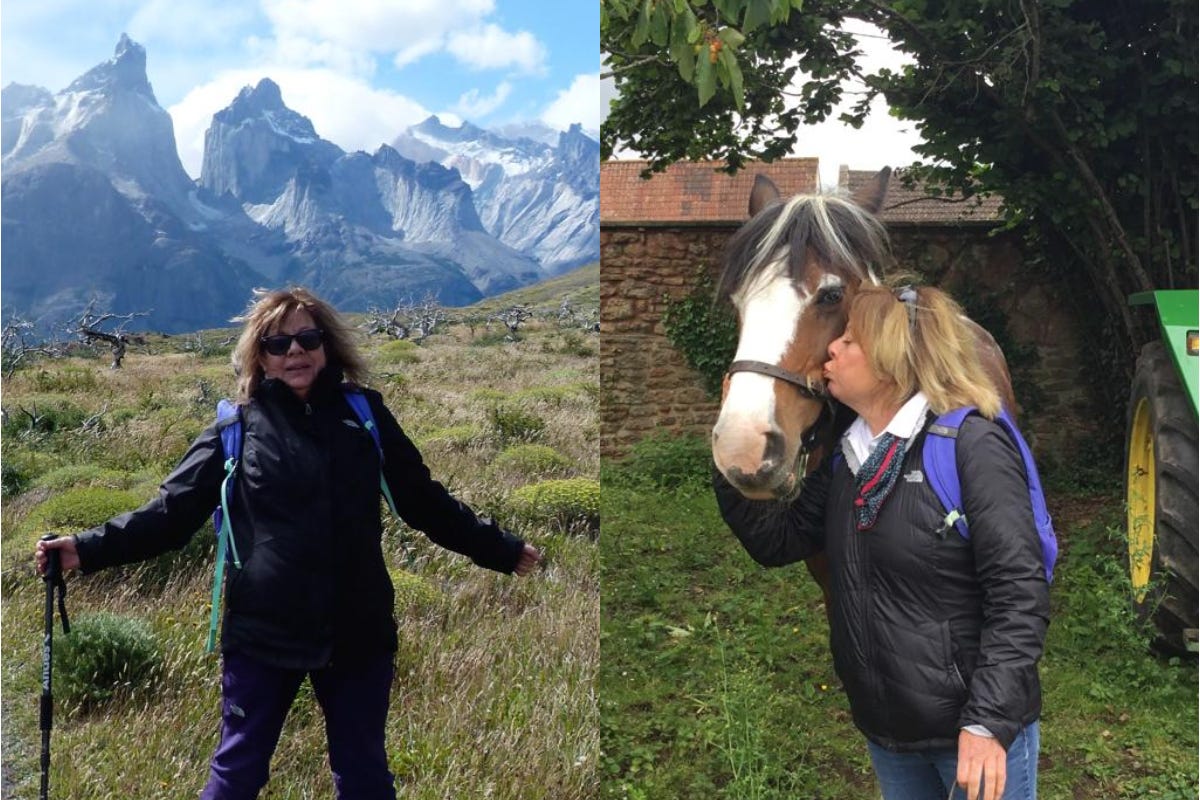
A woman is on a mission to complete items on a ‘visual memory list’, which includes visiting an Australian island with a population of nine and exploring Antarctica, before she goes completely blind.
Tiggi Trethowan, 65, who lives in Somerset, lost her sight in her right eye about 15 years ago and is down to 6% sight in the left eye, with doctors telling her: “My eyesight is hanging off a cliff edge of dental floss which could break at any time.”
The diagnosis means she will eventually go completely blind, and Ms Trethowan said it was important for her to create a “visual memory list” and visit places she has particularly loved or wants to travel to.
A sighted guide is always with her on the trips, with Ms Trethowan’s black Labrador Jackie, who she got around five years ago through Guide Dogs and is her “absolute life”, present at some.
“If I see a sight that I want to put in my visual memories, I actually always physically stop and click my eyes almost like a camera and consciously store it as a mental photograph,” she told the PA news agency.
“Even before I found out I had 6% of my sight in the left eye, I realised that the opportunities others have of being able to look at a beautiful painting or look at pictures in a photo album when my sight was completely gone would not be an option.
“My choices were to climb into bed, put the duvet over me and never get up again, or get up and revisit places I have loved and people I have loved.”
So far she has been to new places including Patagonia, Chile and Argentina, with the “most dramatic” being Antarctica, which she travelled through on a fishing boat with her guide.
The “pinnacle” of the visual list has been a trip to Wales to see humpback whales.
“We went to a tiny little scientific station on an island, where scientists work with humpback whales in the area,” she said.
“We slept on a beach in these pods and on one day we went to a field where there were over 30 humpback whales.
“They were just like stepping stones – we were right amongst them, it was so magical.”
Last month Guide Dogs surprised Ms Trethowan by organising for her to take on Go Ape Bracknell’s Treetop Challenge, which includes tree-to-tree crossings and ziplines, with the help of Mark “Billy” Billingham, 57, from Channel 4’s SAS: Who Dares Wins.
“There were so many ropes and harnesses, so for somebody with 6% sight, it was a challenge,” Ms Trethowan said.
“But I literally threw myself into it and the good thing about being blind is that I can’t see where the ground is, so it didn’t really matter.
“I can’t tell you how kind Billy was. He never pushed me, but was always there to support.
“We did the really big zip line together and I turned to him and said ‘have I broken you’ and he said ‘finally, you have broken me’.”
Mr Billingham, who is based in Herefordshire and also spends a lot of time in Lake Worth, Florida, told PA it was an “absolute pleasure” to be involved.
“Tiggi is like a little generator, she is always smiling and full of positive energy, and she’s a little trickster as well.
“She actually put me through my paces, if I’m honest, and I think I was more nervous than she was.
“[On the final zipline], it was actually quite tough, but there was no stopping her – she grabbed on to my hand and just went off and she screamed and we crash landed at the bottom and it was a really nice moment.”
He added that Ms Trethowan is a great example of someone who has faced an obstacle and overcome it.
“Everyone is going to face a dark space or obstacle,” he said.
“It’s just an obstacle and the quicker we attack that obstacle and the faster we get through it, the faster we enjoy what we should be enjoying again.”
Ms Trethowan has advised people who may be worried about losing their sight to “never give up, never give in”.
“It’s a diagnosis. Yes, it could potentially be life-limiting, but it is not life threatening.
“It is simply a form of renavigation.”
Ms Trethowan, who previously worked in broadcast on a freelance basis and is involved with numerous projects including being a Guide Dogs ambassador, added that when she first got her diagnosis, it was hard news to take.
“I mean I literally lost my home, I couldn’t drive any more, I was nearly bankrupt because I couldn’t pay the bills,” she said.
“But after coming to terms with it, I realised that losing my sight has given me more than it has taken away.
“And Guide Dogs has always been there for me and they assess me and Jackie regularly.”
Remaining items on the list include travelling to Costa Rica to visit Fortuna Sloth Sanctuary, a trip to Kenya, a country she previously visited while working on a documentary with Amref Flying Doctors, and revisiting Dirk Hartog Island, in Australia, which has a population of nine.
Guide Dogs provide a sighted guide service to support people with sight loss to live the life they choose.
More information about becoming a Guide Dogs ‘My Sighted Guide’ volunteer can be found at www.guidedogs.org.uk







